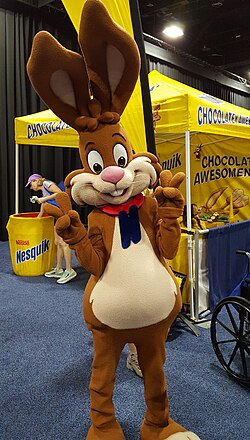Nestlé
| Mind your own Business |
| "You're fired!" |
Nestlé (with the accent over the e so you don't confuse it with children nestled all snug in their beds) is a major worldwide food-and-drink seller based in Switzerland.
As with many large successful corporations, they've been accused of all sorts of malfeasance, and some of these accusations are true.[1]
Stuff Nestlé is fairly accused of[edit]
Child labor in the Ivory Coast[edit]
Nestlé didn't perform due diligence into their Ivory Coast cocoa farms, to ensure that child labor wasn't being used. Eventually, the Fair Labor Association (FLA) found out,[2] and the International Labor Rights fund filed a lawsuit, which Nestlé fought.[3] (Ultimately, the U.S. supreme court ruled in Nestlé's favor, saying that they can't be sued because the Alien Tort Statute doesn't apply to their situation.[4])
Exploiting Pakistan's water supply[edit]
Nestlé is the biggest seller of bottled water in the world. They've gotta get that water from somewhere. In one case, they got it from wells in Pakistan's Bhati Dilwan community by digging a deep well there, which seems to have deprived the locals of part of their water supply. This water was bottled and sold as Nestlé Pure Life, which the locals couldn't generally afford.[5]
Stuff Nestlé is semi-fairly accused of[edit]
Exploiting Michigan's water supply[edit]
In Michigan, Nestlé pumps over half a million gallons of water each day for bottling, for which the state charges them only US$200 per year[6]. This works out to around 200 million gallons per year. That may sound like a lot, but they're in no danger of depriving the area of fresh water; lake Michigan contains 1.3 quadrillion gallons of water, roughly two billion times what Nestlé consumes per day, and this is continually replenished by rainfall.[7]
Contaminated cookie dough[edit]
In 2009, it was discovered that some of Nestlé's refrigerated cookie dough was contaminated with E. coli O157:H7, the dangerous strain that causes foodborne illness. The contamination was only discovered because dozens of illnesses were reported[8]. Heat will kill these bacteria, however; this is why packaged refrigerated cookie dough always carries the warning "Do not eat raw cookie dough."
Pollution[edit]
Allegedly, in the United Kingdom[9] and China,[10] Nestlé exceeded the legal limits on water pollution and other forms of pollution. In both cases, several companies were implicated; there's no indication that Nestlé's operations were any more egregious than those of the other companies in the same area.
Slave labor in Thailand[edit]
Nestlé was, indeed, involved in the use of slave labor in Thailand. However, this fact only came to light because Nestlé themselves launched an investigation into it, and found that forced labor was indeed occurring. Once they discovered this, they stopped using this source of labor.[11]
Stuff Nestlé is unfairly accused of[edit]
Melamine-tainted milk[edit]
Nestlé was widely blamed for the 2008 Chinese milk scandal![]() in which milk products, including infant formula, were tainted with melamine and killed at least 6 babies.
in which milk products, including infant formula, were tainted with melamine and killed at least 6 babies.
However, Nestlé was not among the companies implicated within China, and none of its milk products manufactured there were intended for sale within China. Only its Taiwanese exports had detectable levels of melamine, and these levels were so low as not to pose a health risk — and none of these products were baby formula.[12]
"Water isn't a human right"[edit]
Nestlé's former CEO Peter Brabeck-Letmathe is infamous for having said the following:
“”The one opinion, which I think is extreme, is represented by the NGOs, who bang on about declaring water a public right. That means that as a human being you should have a right to water. That’s an extreme solution. The other view says that water is a foodstuff like any other, and like any other foodstuff it should have a market value.
|
This quote is taken out of its larger context, however. From the full quote, he seems to be interested in preserving access to water for local populations, not grabbing it all up for themselves.[13]
See also[edit]
External links[edit]
- Jon Oliver discussing chocolate farmers, which implicates more companies than just Nestlé, but Nestlé's in there too, on YouTube
References[edit]
- ↑ Why Nestle is one of the most hated companies in the world
- ↑ Nestle 'failing' on child labour abuse, says FLA report, BBC News, 29-June-2012
- ↑ Nestlé admits slavery in Thailand while fighting child labour lawsuit in Ivory Coast, The Guardian, 1-Feb-2016
- ↑ Nestlé v. Doe, 19-416 (17-June-2021)
- ↑ Poisoning The Well? Nestlé Accused Of Exploiting Water Supplies For Bottled Brands, worldcrunch, 19-Jan-2012
- ↑ Residents outraged by new water deal allowing Nestle to pump millions of gallons from Michigan, WDIV ClickOnDetroit, 2018. The article's listed figure of 1.1 million gallons per day is Nestlé's total water pumping worldwide, not just for Michigan.
- ↑ For Each Gallon Of Water Michigan’s People Use, 288 Gallons Fall From The Sky, Michigan Capitol Confidential, 12-April-2018
- ↑ How Eating Raw Cookie Dough Led to One Mom's Death, Son Recalls, ABC News, 14-Nov-2014
- ↑ Illegal Water Pollution Rife, Friends of the Earth, 16-Sept-1997
- ↑ Shell, Nestlé and Motorola among companies failing to come clean about pollution in China, says Greenpeace, The Guardian, 13-Oct-2009
- ↑ Nestlé admits to forced labour in its seafood supply chain in Thailand, The Guardian, 24-Nov-2015
- ↑ Melamine found in Nestle milk products: minister, 2-October-2008
- ↑ Did the Chief Executive Officer of Nestlé Say Water Is Not a Human Right?, Snopes
